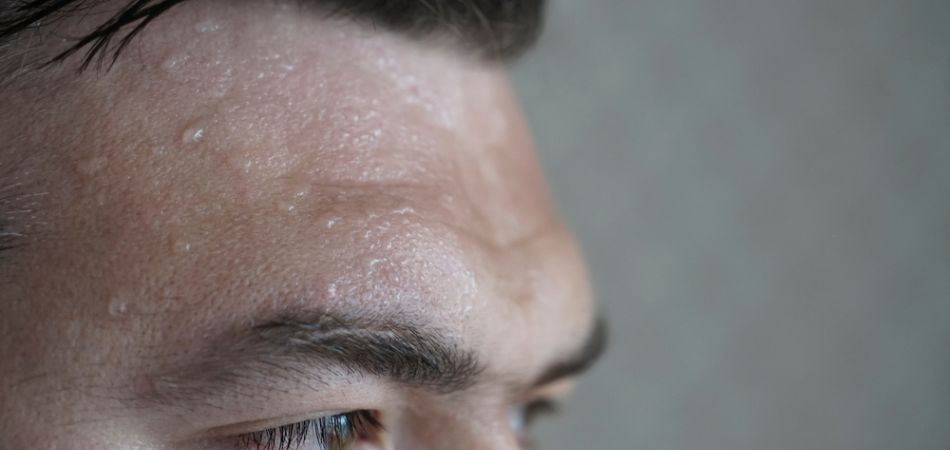Last Updated:
September 29th, 2025

The longer a person continues their drug use, the more likely they are to experience unfamiliar and sometimes unsettling side effects. Once in the grips of addiction, it is easy to dismiss some of the “minor” side effects as “no real cause for concern.”
Yet not all of these minor signs are as innocuous as many of us first think. They can be an indicator that something complicated and ominous is happening inside the body.
We explore the connection between sweating and drugs, highlighting which substances are the most common culprits, and when you should take it as a warning sign. If you’re concerned about drug-induced sweating, this could be your first step towards making a positive change.
How does drug use relate to sweating?
Our body is built with thousands of response mechanisms for the things we eat, drink and ingest. Sweating is one of the body’s natural ways to regulate its internal temperature. Sweating is also used for flushing out toxins in the body.
These processes strive to keep your body in balance, or “homeostasis,” and drug use can throw this balance into chaos. Many drugs, legal and illegal, directly affect your central nervous system and disrupt how your brain manages body temperature and blood pressure. There’s also the element of added stress, as hormones that regulate stress levels are impaired. As a result, you might find yourself drenched in sweat even when sitting still, or breaking into night sweats that soak your bedsheets.
For some, this reaction is only temporary, such as a common side effect when starting a prescription drug. But when sweating is linked to alcohol or recreational drug use, excessive perspiration is often a sign of the body struggling under the strain of intoxication. Sweating heavily is also quite common in detox withdrawal, called “hyperhidrosis” in medical circles.
Understanding the ways drug use causes your body to sweat is the first step in recognising when it may be pointing to a more serious health issue.
Which substances are most commonly linked with sweating?
While almost any drug can alter your body’s internal balance, certain substances more commonly cause excessive perspiration. Sweating may occur more frequently both during active use and during the body’s detoxification process. Research shows that people commonly experience sweating during withdrawal, as their autonomic regulation is disrupted.
Some of the most common substances that have a direct impact on how much you sweat include:
When does sweating signal a more serious issue?
In most cases, excessive sweating after drug use is uncomfortable but not life-threatening. However, there may be occasions when excessive perspiration is pointing to something more dangerous, for which you should speak with your GP or health provider.
These signs include:
- Sweating with chest pain or a racing heart: Having these symptoms appear together can be a signal of a heart complication, especially if they occur with stimulants like cocaine or amphetamines.
- Sudden, unexplained perspiration: If sweating appears out of nowhere and you can’t find a clear cause, it could indicate an adverse reaction to a substance you have taken.
- Sweating alongside disorientation, hallucinations or seizures: This combination of symptoms can suggest a severe withdrawal, or another medical emergency. Intense disorientation and visions can be a sign of “serotonin syndrome,” which can be potentially fatal if not treated.
In these situations, it is critical not to dismiss sweating as “just a side effect.” Seeking urgent medical support may become a matter of life or death, or at least prevent serious medical harm.
How can I manage drug-induced sweating?
Sweating is not always a sign of a dangerous interaction happening in your body, though you may wish to take steps to mitigate the effects. Here are some practical ways to keep excessive perspiration under control and reduce your discomfort:
- Stay hydrated and replenish electrolytes: The first piece of advice we offer is the simplest, yet most important. To ensure sweating is manageable, be sure to stay constantly hydrated, opting for water or electrolyte-based drinks instead of sugary beverages. Especially during recovery, dehydration can in fact be a cause of perspiration, so make a conscious effort to drink more water.
- Wear breathable clothing and keep your environment cool: During periods of active drug use and recovery, wearing clean, breathable fabrics will keep you cooler and often a lot calmer. Small comforts can lead to significant improvements in quality of life, as research shows that your sensitivities to sensory stimulation increase when under the influence and in recovery.
- Practise good hygiene and self-care routines: Taking steps to make sure you’re showering regularly can make sweating less disruptive to your daily life. Keep a set of spare clothes ready and try using antiperspirants if they agree with your skin.
- Seek medical help when necessary: As we’ve mentioned, if sweating is severe or paired with other worrying symptoms, a doctor’s advice is the best thing to seek. They can determine if medication adjustments or treatment are required, and you’ll have the peace of mind knowing whether or not something more dangerous is happening inside you.
Where can I find support if sweating is linked to addiction?
If sweating is tied to regular drug or alcohol use, you should find out whether you’re experiencing more than just a minor side effect. You might be facing a sign of dependency, and you should get ready to tackle the underlying addiction before your health worsens.
At UKAT, we specialise in medical detox and personalised rehab programmes to address both the physical symptoms and the psychological roots of addiction.
If you or someone you know is struggling, don’t ignore the signs. Reach out to UKAT today and take the first step towards lifelong recovery.
(Click here to see works cited)
- NHS Choices, NHS, www.nhs.uk/conditions/excessive-sweating-hyperhidrosis
- Lerner A, Klein M. Dependence, withdrawal and rebound of CNS drugs: an update and regulatory considerations for new drugs development. Brain Commun. 2019 Oct 16;1(1):fcz025. doi: 10.1093/braincomms/fcz025. PMID: 32954266; PMCID: PMC7425303.
- Moh I, Simon D, Gross ER. The Alcohol Flush Response. Graph Med Rev. 2024;4(1):e807. doi: 10.7191/gmr.807. Epub 2024 Feb 22. PMID: 38895023; PMCID: PMC11185044.
- “Opioid Withdrawal Symptoms.” Healthdirect, Healthdirect Australia, www.healthdirect.gov.au/opioid-withdrawal-symptoms
- Pieretti, Lisa. “Consequence of Taking Antidepressants: Excessive Sweating! – International Hyperhidrosis Society: Official Site.” International Hyperhidrosis Society | Official Site, 5 Aug. 1970, www.sweathelp.org/where-do-you-sweat/sweaty-armpits/170-media-contacts/307-common-consequence-of-taking-antidepressants-excessive-sweating.html.
- Canadian Cancer Society / Société canadienne du cancer. “Side Effects of Hormone Therapy.” Canadian Cancer Society, cancer.ca/en/treatments/treatment-types/hormone-therapy/side-effects-of-hormone-therapy
- Simon LV, Torrico TJ, Keenaghan M. Serotonin Syndrome. [Updated 2024 Mar 2]. In: StatPearls [Internet]. Treasure Island (FL): StatPearls Publishing; 2025 Jan-. Available from: https://www.ncbi.nlm.nih.gov/books/NBK482377/
- Increased Pain Sensitivity in Alcohol Withdrawal Syndrome – Jochum – 2010 – European Journal of Pain – Wiley Online Library, onlinelibrary.wiley.com/doi/abs/10.1016/j.ejpain.2009.11.008


